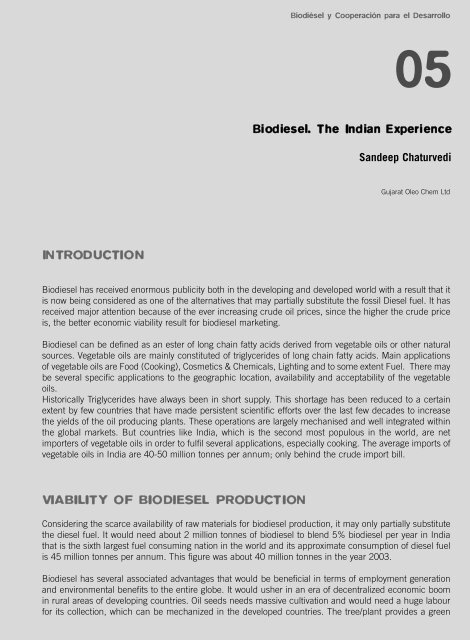Llibro_ISF_biodiesel
Llibro_ISF_biodiesel
Llibro_ISF_biodiesel
Create successful ePaper yourself
Turn your PDF publications into a flip-book with our unique Google optimized e-Paper software.
INTRODUCTION<br />
Biodiésel y Cooperación para el Desarrollo<br />
05<br />
Biodiesel. The Indian Experience<br />
Sandeep Chaturvedi<br />
Gujarat Oleo Chem Ltd<br />
Biodiesel has received enormous publicity both in the developing and developed world with a result that it<br />
is now being considered as one of the alternatives that may partially substitute the fossil Diesel fuel. It has<br />
received major attention because of the ever increasing crude oil prices, since the higher the crude price<br />
is, the better economic viability result for <strong>biodiesel</strong> marketing.<br />
Biodiesel can be defined as an ester of long chain fatty acids derived from vegetable oils or other natural<br />
sources. Vegetable oils are mainly constituted of triglycerides of long chain fatty acids. Main applications<br />
of vegetable oils are Food (Cooking), Cosmetics & Chemicals, Lighting and to some extent Fuel. There may<br />
be several specific applications to the geographic location, availability and acceptability of the vegetable<br />
oils.<br />
Historically Triglycerides have always been in short supply. This shortage has been reduced to a certain<br />
extent by few countries that have made persistent scientific efforts over the last few decades to increase<br />
the yields of the oil producing plants. These operations are largely mechanised and well integrated within<br />
the global markets. But countries like India, which is the second most populous in the world, are net<br />
importers of vegetable oils in order to fulfil several applications, especially cooking. The average imports of<br />
vegetable oils in India are 40-50 million tonnes per annum; only behind the crude import bill.<br />
VIABILITY OF BIODIESEL PRODUCTION<br />
Considering the scarce availability of raw materials for <strong>biodiesel</strong> production, it may only partially substitute<br />
the diesel fuel. It would need about 2 million tonnes of <strong>biodiesel</strong> to blend 5% <strong>biodiesel</strong> per year in India<br />
that is the sixth largest fuel consuming nation in the world and its approximate consumption of diesel fuel<br />
is 45 million tonnes per annum. This figure was about 40 million tonnes in the year 2003.<br />
Biodiesel has several associated advantages that would be beneficial in terms of employment generation<br />
and environmental benefits to the entire globe. It would usher in an era of decentralized economic boom<br />
in rural areas of developing countries. Oil seeds needs massive cultivation and would need a huge labour<br />
for its collection, which can be mechanized in the developed countries. The tree/plant provides a green


